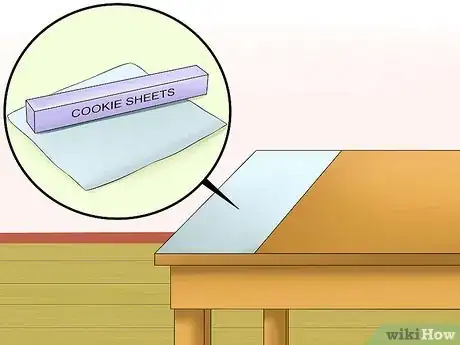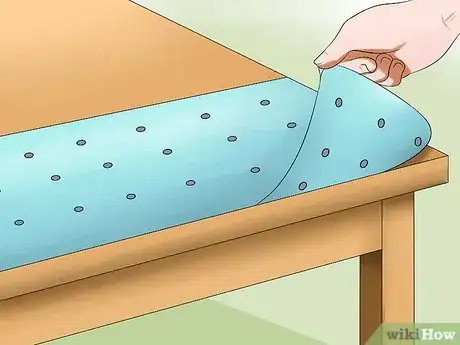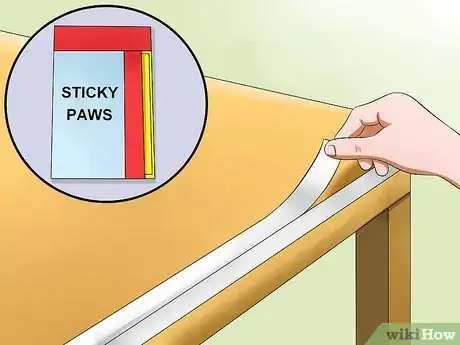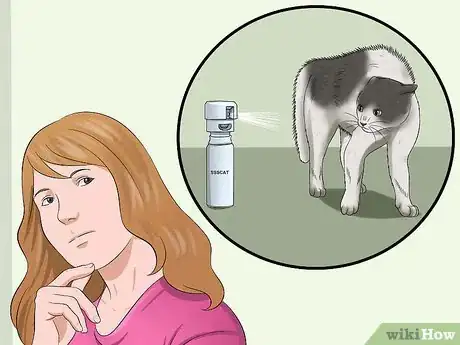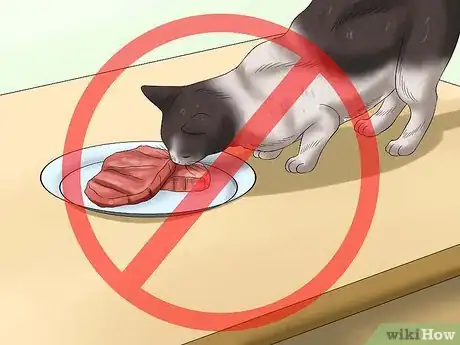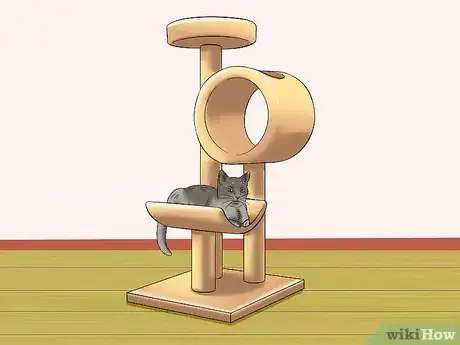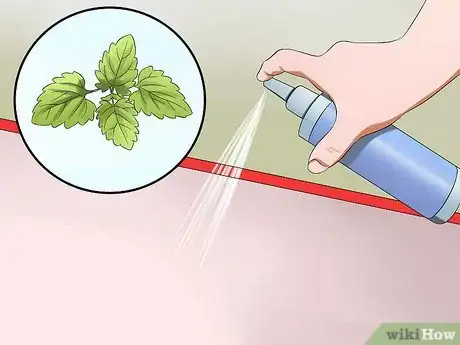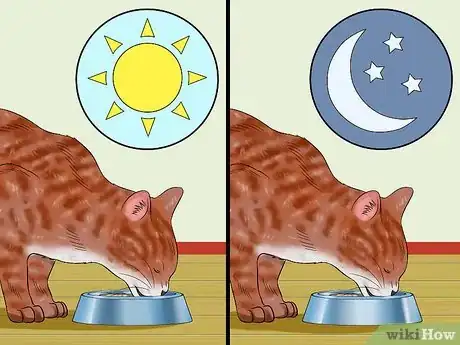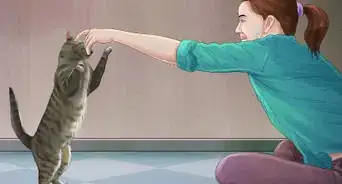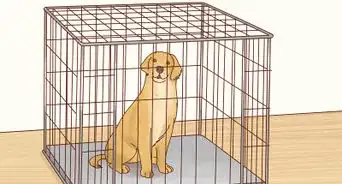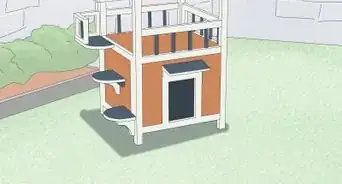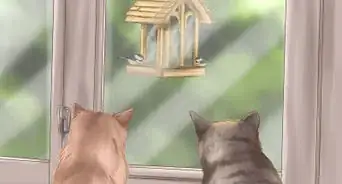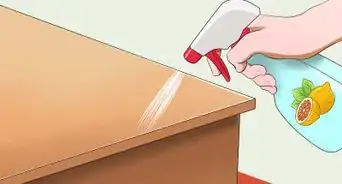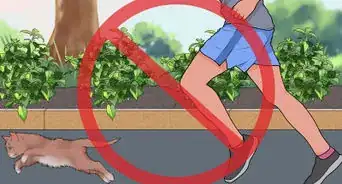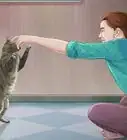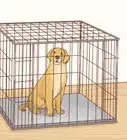This article was co-authored by Jessica Char. Jessica Char is a Cat and Dog Trainer, Behavior Consultant, and the Founder of Feline Engineering and Canine Engineering. She specializes in modifying challenging pet behavior problems, such as fear and aggression, using positive reinforcement training protocols. Jessica is a Certified Fear Free Trainer, a Certified Professional Dog Trainer, and a Certified Separation Anxiety Trainer. She is also a member of the International Association of Animal Behavior Consultants. Jessica received her BS and MS in Biomedical Engineering from Washington University in St. Louis.
There are 7 references cited in this article, which can be found at the bottom of the page.
This article has been viewed 147,903 times.
Cats have a natural instinct to climb to high places and get a good view of the area. Unfortunately, this tendency sometimes brings them to places they aren't supposed to climb, like the kitchen table. Cats will be cats, but the good news is you can make them be cats somewhere away from your food. We'll show you some simple methods to deter your feline friends from counters or table, and encourage them to spend their time somewhere else.
Things You Should Know
- Line the edges of your countertops with cookie sheets, carpet runners, or double-sided tape.
- Set up indoor cat furniture to provide your cat with more interesting places to explore.
- Use catnip or cat food to keep your cat entertained on the floor.
- Feed your cat more and break up meal times to 3 times a day to keep your cat from prowling for food.
Steps
Deterring the Cat
-
1Place lightweight cookie sheets on the edge of the table. Punishing the cat yourself when he goes up on the table probably won't get the desired result; he'll probably just end up afraid of you, not the table. Instead, make the environment punish him so he finds the area undesirable. One way to do this is with lightweight cookie sheets.[1]
- Place the cookie sheets along the edge of the table. That way, when your cat jumps on the table, he'll knock them over. The resulting loud noise will startle your cat and he'll learn not to jump up on the table.
-
2Place plastic carpet runners on the table. These usually have plastic bumps on the bottoms to provide traction on a carpet. Place the runner upside down so these bumps are facing up. Your cat won't enjoy the sensation of walking on this and should gradually stop going on the table.[2] [3]Advertisement
-
3Use double-sided tape on the table top. Cats also don't like sticky sensations on their paws. A product called Sticky Paws serves this purpose. It is sticky enough to stay in place and get your cat's attention, but not so sticky that it will damage furniture or your cat's paws.[4] Place this on your table to discourage your cat from venturing up there.[5]
- Remember that if you don't use a specialized pet product, the tape might be too sticky and you could hurt your cat and damage your furniture. Always test out the tape before using it to make sure it's not too sticky.
-
4Investigate other commercially available deterrent devices. There are a few specialized deterrent devices available in pet stores. In addition to these do-it-yourself methods, you can look into some devices to help keep your cat off the table. Remember to use all devices as they are intended and ask your vet or a pet store employee if you need any suggestions.[6]
- The Snappy Trainer acts like an upside down mouse trap, but is much weaker and won't hurt your cat. Any touch will cause the device to shoot up in the air, which will startle your cat and keep him off the table.
- The SSSCAT is a motion sensing device that shoots out a blast of compressed air when tripped. This blast will scare your cat away from the table or anywhere else you don't want him to go.[7]
- The ScanMat is a plastic sheet that holds a static charge. When your cat steps on the sheet, he won't like the sensation of the electricity on his feet.
-
5Avoid leaving any food out. An easy preventative measure to keep the cat off the table is to take away his reason to go up there. If your cat is roaming around because he's hungry, finding food on the table or counter will reinforce his reason for going up there. Don't leave any food out.[8] That way, he'll learn that there's nothing to eat up there and may gradually stop going up on his own.[9]EXPERT TIPDr. Elliott, BVMS, MRCVS is a veterinarian with over 30 years of experience in veterinary surgery and companion animal practice. She graduated from the University of Glasgow in 1987 with a degree in veterinary medicine and surgery. She has worked at the same animal clinic in her hometown for over 20 years.Veterinarian

 Pippa Elliott, MRCVS
Pippa Elliott, MRCVS
VeterinarianPippa Elliott, a licensed veterinarian, advises: "Be aware that punishing the cat will only make the cat wary of you. They will still jump up, but wait until you aren't there to tell them off."
Providing Alternatives
-
1Get indoor cat furniture. Since cats naturally like to climb, you shouldn't try to discourage your cat from climbing altogether. Instead, give him alternatives to climbing on your table and counters.[10] A good substitute is "tree" style indoor cat furniture. These usually have perches and platforms for your cat to jump onto, which will satisfy the natural desire to climb. As an added bonus, they are usually coated with carpeting to make them a comfortable resting place for your cat.[11]
-
2Make an alternate area attractive for your cat. Your cat might gravitate towards the kitchen table because he finds it comfortable.[12] Counteract this by making another area more appealing. In addition to buying specialized cat furniture, you can take a few steps to turn a different area in your cat's favorite.[13]
- Rub catnip on a certain area to attract your cat to it.
- Place your cat's food in the area you want him to go.
- Play with your cat in the new area. Pet him and give him praise so he learns to associate the new area with good feelings.
-
3Feed your cat more. Cats often roam around looking for food, which can lead them to kitchen tables and counters. If your cat keeps going up on the kitchen table, he may be searching for food. You can counteract this instinct by using a few different techniques to feed your cat.[14]
- Try breaking up your cat's meals into several feeding times throughout the day. The continuous supply of food will help keep your cat's hunger satisfied and he won't roam around looking for food.
- You could also try free feeding your cat. With this method, you simply fill your cat's bowl at the beginning of the day and allow him to eat whenever he wants. This could also help keep him satisfied so he doesn't roam. Closely monitor your cat's weight, however, since free access to food could make him overweight.[15]
Expert Q&A
-
QuestionWhy does my cat get on the table?
 Jessica CharJessica Char is a Cat and Dog Trainer, Behavior Consultant, and the Founder of Feline Engineering and Canine Engineering. She specializes in modifying challenging pet behavior problems, such as fear and aggression, using positive reinforcement training protocols. Jessica is a Certified Fear Free Trainer, a Certified Professional Dog Trainer, and a Certified Separation Anxiety Trainer. She is also a member of the International Association of Animal Behavior Consultants. Jessica received her BS and MS in Biomedical Engineering from Washington University in St. Louis.
Jessica CharJessica Char is a Cat and Dog Trainer, Behavior Consultant, and the Founder of Feline Engineering and Canine Engineering. She specializes in modifying challenging pet behavior problems, such as fear and aggression, using positive reinforcement training protocols. Jessica is a Certified Fear Free Trainer, a Certified Professional Dog Trainer, and a Certified Separation Anxiety Trainer. She is also a member of the International Association of Animal Behavior Consultants. Jessica received her BS and MS in Biomedical Engineering from Washington University in St. Louis.
Cat & Dog Behavior Consultant Cats typically want to be up on the table because it's natural for them to want to get up high so they can see the world they inhabit, also known as your house.
Cats typically want to be up on the table because it's natural for them to want to get up high so they can see the world they inhabit, also known as your house. -
QuestionHow do I get my cat to stop jumping on my desk?
 Jessica CharJessica Char is a Cat and Dog Trainer, Behavior Consultant, and the Founder of Feline Engineering and Canine Engineering. She specializes in modifying challenging pet behavior problems, such as fear and aggression, using positive reinforcement training protocols. Jessica is a Certified Fear Free Trainer, a Certified Professional Dog Trainer, and a Certified Separation Anxiety Trainer. She is also a member of the International Association of Animal Behavior Consultants. Jessica received her BS and MS in Biomedical Engineering from Washington University in St. Louis.
Jessica CharJessica Char is a Cat and Dog Trainer, Behavior Consultant, and the Founder of Feline Engineering and Canine Engineering. She specializes in modifying challenging pet behavior problems, such as fear and aggression, using positive reinforcement training protocols. Jessica is a Certified Fear Free Trainer, a Certified Professional Dog Trainer, and a Certified Separation Anxiety Trainer. She is also a member of the International Association of Animal Behavior Consultants. Jessica received her BS and MS in Biomedical Engineering from Washington University in St. Louis.
Cat & Dog Behavior Consultant Make sure that you provide appropriate high places for your cat to be up off the ground, preferably in the same room as the desk you're trying to keep them off.
Make sure that you provide appropriate high places for your cat to be up off the ground, preferably in the same room as the desk you're trying to keep them off. -
QuestionHow do I keep my cat off my high places?
 Jessica CharJessica Char is a Cat and Dog Trainer, Behavior Consultant, and the Founder of Feline Engineering and Canine Engineering. She specializes in modifying challenging pet behavior problems, such as fear and aggression, using positive reinforcement training protocols. Jessica is a Certified Fear Free Trainer, a Certified Professional Dog Trainer, and a Certified Separation Anxiety Trainer. She is also a member of the International Association of Animal Behavior Consultants. Jessica received her BS and MS in Biomedical Engineering from Washington University in St. Louis.
Jessica CharJessica Char is a Cat and Dog Trainer, Behavior Consultant, and the Founder of Feline Engineering and Canine Engineering. She specializes in modifying challenging pet behavior problems, such as fear and aggression, using positive reinforcement training protocols. Jessica is a Certified Fear Free Trainer, a Certified Professional Dog Trainer, and a Certified Separation Anxiety Trainer. She is also a member of the International Association of Animal Behavior Consultants. Jessica received her BS and MS in Biomedical Engineering from Washington University in St. Louis.
Cat & Dog Behavior Consultant Make the furniture uninteresting to the cat. Don't give it your attention and remove all the food from the table. You can also cover the table with something that's a little uncomfortable. You don't need to scare or hurt the cat, just make it more fun to sit on their appropriate spot than it is to sit on the table.
Make the furniture uninteresting to the cat. Don't give it your attention and remove all the food from the table. You can also cover the table with something that's a little uncomfortable. You don't need to scare or hurt the cat, just make it more fun to sit on their appropriate spot than it is to sit on the table.
Warnings
- Never hit or physically discipline your cat in any way. No good will come of that. Not only will you hurt your cat, but it won't even correct his behavior; instead of learning what he's not supposed to do, the cat will just learn to fear you.⧼thumbs_response⧽
References
- ↑ https://www.aspca.org/pet-care/virtual-pet-behaviorist/cat-behavior/keeping-your-cat-countertops-and-tables
- ↑ https://www.petfinder.com/cats/cat-problems/stop-cat-jumping-table/
- ↑ Rita Reimers. Cat Behaviorist. Expert Interview. 22 June 2021.
- ↑ https://www.petfinder.com/cats/cat-problems/stop-cat-jumping-table/
- ↑ Jessica Char. Cat & Dog Behavior Consultant. Expert Interview. 28 September 2021.
- ↑ http://pets.webmd.com/cats/guide/keeping-cat-countertops-tables?page=2
- ↑ Rita Reimers. Cat Behaviorist. Expert Interview. 22 June 2021.
- ↑ Jessica Char. Cat & Dog Behavior Consultant. Expert Interview. 28 September 2021.
- ↑ http://pets.webmd.com/cats/guide/keeping-cat-countertops-tables?page=1#2
- ↑ Jessica Char. Cat & Dog Behavior Consultant. Expert Interview. 28 September 2021.
- ↑ https://www.aspca.org/pet-care/virtual-pet-behaviorist/cat-behavior/keeping-your-cat-countertops-and-tables
- ↑ https://www.petfinder.com/cats/cat-problems/stop-cat-jumping-table/
- ↑ Jessica Char. Cat & Dog Behavior Consultant. Expert Interview. 28 September 2021.
- ↑ https://www.aspca.org/pet-care/virtual-pet-behaviorist/cat-behavior/keeping-your-cat-countertops-and-tables
- ↑ http://www.petmd.com/cat/nutrition/evr_ct_best_feeding_method
- ↑ https://www.petfinder.com/cats/cat-problems/stop-cat-jumping-table/
About This Article
To keep your cat off the dinner table, try placing some lightweight cookie sheets along the edge of it so your cat will be startled when it jumps on the table and knocks over the sheets. Alternatively, line the edges with plastic carpet runners, which have a texture that cats don’t like walking on. You can also try using double-sided tape that’s safe for pets, such as Sticky Paws, since cats dislike sticky sensations on their paws. For advice from our Veterinary co-author on how to keep your cat off the table by making other areas of your home more attractive, keep reading!
